REMEMBER THE SAUDI INVASION OF SEPT 11 AND THE TWIN TOWERS
THE BIDEN CRIME FAMILY OF PARASITE LAWYERS IN THE MIDDLE EAST
JAMES BIDEN RAKES IT IN!
Jesse Watters Primetime
Biden hands blank check to Saudi Arabia in Middle East visit
Following his two-day trip to Israel, US President Joe Biden arrived in Saudi Arabia’s western port city of Jeddah on Friday morning, where the blood-stained murderer Crown Prince Mohammed bin Salman greeted him unsmilingly with a fist bump at the Al-Salam Royal Palace. This was a far cry from the traditional greeting by leading members of the ruling family for a US president at the airport.
Following a courtesy call to the aging and infirm King Salman, Biden held “a working session” with bin Salman, the de facto ruler, and his ministers. Although Biden had pledged during his election campaign to treat Saudi Arabia as a “pariah state” due to its appalling human rights record and bin Salman’s signing off on Jamal Khashoggi’s gruesome assassination in 2018, the pressing needs of Washington’s geostrategic interests have taken precedence over his avowed scruples.
On Saturday, he will attend a summit with the leaders of the six Gulf States—Saudi Arabia, the United Arab Emirates (UAE), Bahrain, Kuwait, Qatar and Oman—plus Egypt, Jordan and Iraq.
Biden’s purpose is to reassert Washington’s standing with some of the most tyrannical rulers on the planet and line them up behind Washington’s proxy war against Russia in Ukraine—justified with the cynical call “to stop mass death and a humanitarian catastrophe.” The war has met a decidedly cool response from Israeli and Arab leaders alike.
Biden is also seeking to cement an anti-Iran alliance as part of US imperialism’s broader efforts to limit China’s expanding economic and political influence in the energy-rich Middle East.
Biden came straight from Israel, a key custodian of US interests in the region, which guarantees it exemption from the human rights standards expected of Washington’s opponents. Notwithstanding its parliamentary façade, Israel is distinguished by its apartheid system of rule within its internationally recognized borders, its military suppression of nearly five million Palestinians in the West Bank and Gaza, and its near daily killing of Palestinians. Israeli security forces have killed at least 60 Palestinians in the first six months of this year. All this goes without a murmur from this “leader of the free world” and promoter-in-chief of “human rights.”
The visit to Israel itself was something of a sideshow. Its chief purpose was to present a broader substance to his Middle East tour and limit the widely held view that he was going cap in hand to the Saudis.
Israel’s fragile coalition government, made up of a disparate group of eight political parties headed by the rabid right-winger Naftali Bennett and united only in their antipathy towards former Prime Minister Benjamin Netanyahu, had fallen apart within a year of the Biden administration’s brokering. It was the interim prime minister, Yair Lapid, who will hold office till elections on November 1, the fifth in four years, with whom Biden met.
Human rights, self-determination and all the other buzz words never got a mention. In relation to the Palestinians, Biden gave Lapid everything he wanted. There were no demands for a settlement freeze or concessions to the Palestinians. He did not even raise the issue of Israel’s assassination of Shireen Abu Akleh, the veteran and widely respected journalist for the Al Jazeera Arabic network, even though she held dual US and Palestinian citizenship. Palestinians were enraged that while US investigators confirmed that the bullet which killed Akleh had been fired by an Israeli soldier as she covered an Israeli raid on Jenin in the West Bank, they said the killing 'was not intentional,' even though she was clearly visible and wearing a press jacket and helmet.
Biden made a quick call to Palestinian Authority President Mahmoud Abbas, where he tossed some loose change at the Palestinians: up to $100 million for the East Jerusalem Hospital Network, an additional $201 million for the UN Relief and Works Agency for Palestine Refugees (UNRWA), and an additional $15 million in food aid via the UN World Food Programme and two NGOs. But he had nothing other than platitudes to say about Israeli-Palestinian relations. Abbas for his part reiterated his willingness to resume talks with Israel even though the US allowed Israel to consolidate its occupation of the West Bank.
Biden also held a virtual meeting with leaders from Israel, India and the United Arab Emirates to discuss investment in strategic infrastructure.
His visit ended with the signing of the “Jerusalem Declaration,” reaffirming the US commitment to Israel’s security. In addition to the $3.8 billion a year in aid that the US gives Israel, Tel Aviv will receive a further $1 billion for its Iron Dome defence shield—developed and built with more than $1.6 billion from the US—to replace the missile interceptors used during last year’s 11-day assault on Gaza. He also pledged to provide additional support if exceptional circumstances arise, in effect underwriting any future assaults on Gaza, Lebanon or elsewhere.
While the Declaration reiterated US support for the “two-state solution” and negotiations towards that end, Biden did not even call on Lapid to resume talks with the Palestinians, simply noting at the press conference that he did not expect such a state to emerge “in the near term.”
Only in the context of Iran did Biden fail to please Lapid. While the Declaration reaffirmed the US commitment to building an alliance against Iran and its proxies, Biden refused to issue a deadline for the talks to revive the 2015 nuclear deal that the Trump administration unilaterally abrogated in 2018, reimposing sanctions, or to draw a “red line” that if crossed by Iran would prompt action.
The Declaration’s chief political significance was that it forced Lapid to commit to the US in the war in Ukraine. While not mentioning Russia by name, it says that “The United States and Israel reiterate their concerns regarding the ongoing attacks against Ukraine, their commitment to Ukraine’s sovereignty and territorial integrity, and affirm the importance of continued humanitarian assistance to the people of Ukraine.”
Just hours before Biden left for Saudi Arabia, Saudi aviation officials announced the country would open its airspace to all air carriers, paving the way for overflights to and from Israel and permitting direct charter flights from Israel for Palestinians travelling for the pilgrimage in Mecca, a move which Biden hailed as a small step toward normalizing relations with Israel, saying, “Saudi Arabia’s decision can help build momentum toward Israel’s further integration into the region, including with Saudi Arabia.”
At the press conference at the end of his visit, Biden declared quite openly that the purpose of his visit to Saudi Arabia was to bolster America’s position in the region, which had waned under his watch. He said, “I think we have an opportunity to reassert what I think we made a mistake of walking away from: our influence in the Middle East,” and added, “I want to make clear that we can continue to lead in the region and not create a vacuum, a vacuum that is filled by China and/or Russia.”
Relations with the Gulf States cooled after President Barack Obama’s refusal to back Egypt’s President Hosni Mubarak during the mass protests that were to bring down his government in 2011 and threaten Saudi clients in Bahrain and Yemen. Relations became more strained after Washington signed the 2015 nuclear accords with Iran--whom Riyadh and Abu Dhabi accuse of supporting the Houthi rebels who ousted Riyadh’s puppet government in Yemen in 2015--and did little to counter missile attacks by the Houthi rebels in Yemen.
The Biden administration for its part has been frustrated by Saudi Arabia’s refusal to increase oil production and help bring down fuel prices in the wake of Russia’s attack on Ukraine, which has increased the likelihood that the Democrats will lose in the mid-term elections in the fall. A quarter of the Kingdom’s fuel exports go to China, making it the largest supplier after Russia, and there is talk it is considering accepting Chinese yuan instead of US dollars for its oil sales, undermining the dollar’s dominance.
Speaking briefly after his meeting with bin Salman and Saudi officials on Friday afternoon, Biden listed a number of investment agreements that had been formalized, aimed at countering China’s economic presence in the Kingdom, describing them as “significant business.”
He said that with oil prices dropping in recent days and spare capacity running low, it was unclear how much extra Saudi Arabia could produce and how quickly. The potential outcome of his visit on the energy market would not be felt “for another couple of weeks.”
Famous Fathers, Infamous Sons: Joe Biden v. King Salman of Saudi Arabia
Who's the better boy: Hunter Biden or Mohammed bin Salman?
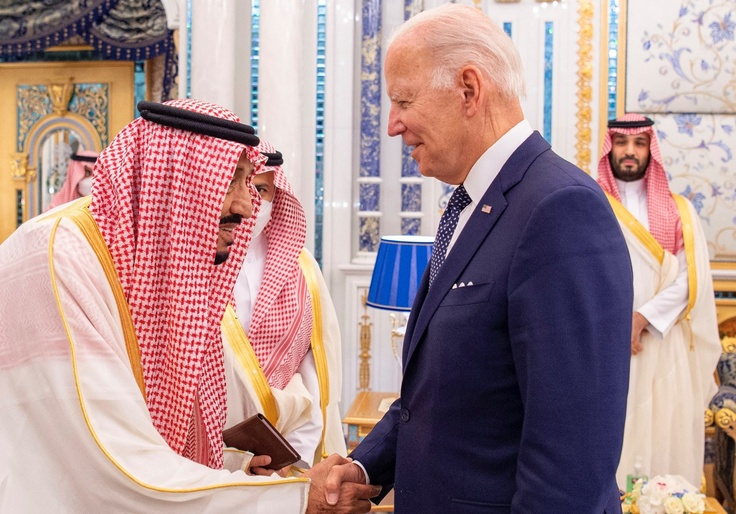
President Joe Biden visited oil-rich Saudi Arabia on Friday to grovel before its authoritarian leader, Crown Prince Mohammed bin Salman (MBS), in a desperate attempt to stem the soaring price of gasoline in the United States. The president fist-bumped MBS upon arriving in Jeddah, which was an embarrassing moment. Not quite as embarrassing, however, as Barack H. Obama's servile bow before the late King Abdullah during his 2009 apology tour.
The trip revealed that Biden's campaign pledge to make Saudi Arabia "pay the price" for human rights abuses—including the 2018 murder and bone-saw dismemberment of Washington Post journalist Jamal Khashoggi—and "make them in fact the pariah that they are" was a blatant lie. (Yes, a lie. The Washington Free Beacon is using that word in contravention of longstanding journalistic norms in an effort to highlight the president's dangerous dishonesty.)
Above all, Biden's trip to Saudi Arabia provides an opportunity to discuss a topic the American mainstream media too often neglect: fatherhood. One of the reasons why the president's meeting with MBS is so significant is that the crown prince is merely the country's de facto leader after gently seizing control from his 86-year-old father, King Salman bin Abdulaziz al Saud.
Shortly after Biden took office in 2021, the White House insisted that King Salman—not the 36-year-old MBS—was "the president's counterpart" in Saudi Arabia. Friday's fist-bump suggests otherwise. Nevertheless, Biden and King Salman have a lot in common. As of Nov. 20, they will both be octogenarians. More importantly, they both understand what it's like to be the famous father of an infamous son.
Speaking of which, Hunter Biden and MBS have a fair amount in common as well. They are both fans of prostitutes and cocaine. Hunter's exploits are legendary, of course, but almost certainly pale in comparison with the debauchery of the crown prince. New York Times reporter Ben Hubbard noted in his 2020 book, MBS: The Rise to Power of Mohammed bin Salman, that MBS once rented out an entire resort in the Maldives and "hosted a string of blowout parties." Shakira and Pitbull reportedly performed at the gatherings, which also featured "an abundance of prostitutes and cocaine."
READ MORE: ‘Bareback Rocket Ride': The Hunter Biden Story
Both sons would presumably have amounted to nothing if not for their powerful dads, who helped finance their lavish and degenerate lifestyles. Just as MBS tapped the royal bank account to pay for his drug-fueled island orgies, Hunter persuaded Joe to keep wiring him money to help cover his $30,000 escort bill. It is safe to say that Hunter is more likely than MBS to film himself having threesomes with crack-addled hookers, but who's to judge?
Hunter and MBS both have five children, although King Salman probably recognizes all of them, unlike Joe, who continues to deny the existence of the baby girl Hunter sired with a stripper named "Dallas." To be fair, it is not publicly known how many children MBS has fathered with strippers and prostitutes who may not enjoy the protections granted by the U.S. justice system.
Unlike his Saudi counterpart, the Biden heir has not yet been credibly accused of murdering and dismembering a journalist. Yet Hunter does enjoy some of the same benefits afforded to Saudi royalty. For example, U.S. mainstream media outlets and tech companies actively suppressed negative stories about Hunter during his father's 2020 presidential campaign. The revelations once denounced as "fake news" have since been largely corroborated.
It is difficult to say, given the facts, which famous father has raised the better boy. Perhaps the most notable difference between Joe Biden and King Salman is that the elderly and infirm Saudi royal knew when it was time to call it quits and hand power to a younger generation. Biden does not appear to share this outlook. This is not to suggest that he should anoint Hunter as his heir apparent, although there's no question the whore-loving crackhead scion would get more votes than Kamala Harris.
REMEMBER THE SAUDI INVASION OF SEPT 11 AND THE TWIN TOWERS
THE BIDEN CRIME FAMILY OF PARASITE LAWYERS IN THE MIDDLE EAST
JAMES BIDEN RAKES IT IN!
Hawley: Biden ‘Groveling’ to Saudi ‘Dictators’ for Oil is ‘Embarrassing’
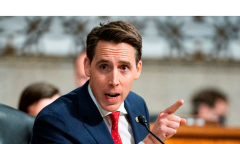
(CNS News) -- Sen. Josh Hawley (R-Mo.) questioned President Joe Biden’s trip to Saudi Arabia today to try to combat high gasoline prices, saying it represents a “change in tone” towards the Muslim monarchy, and that “groveling to these dictators for an increase and begging for oil production is embarrassing.”
According to U.S. intelligence reports and other investigations, the Saudi crown prince, Mohammed bin Salman (MBS), approved a plan to kill Washington Post columnist Jamal Khashoggi. The writer was murdered and dismembered in the Saudi consulate in Istanbul in 2018.
At the U.S. Capitol, CNS News asked Sen. Josh Hawley (R-Mo.), “Do you think it's appropriate for President Biden to travel to Saudi Arabia and meet with Mohammed bin Salman, the crown prince?”
Hawley said, “I mean, I guess it's up to him. I will say that it's certainly a change in tone from where he was earlier and what he said about the crown prince, and then go groveling to increase oil production is particularly embarrassing.”
“I mean, and for that matter, groveling to these dictators for an increase and begging for oil production is embarrassing,” said the senator.
Biden is expected to meet with Mohammed Bin Salman today, July 15, in a trip many suspect is crafted to secure more oil because domestic gasoline prices are very high.
When campaigning for office in 2020, Biden said, “I guarantee you, we’re going to end fossil fuels.” Once in office, Biden took action to reduce domestic oil production, including revoking the permit for the Keystone XL Pipeline, which was expected to carry 830,000 barrels per day of Alberta oil sands crude to Nebraska, according to CNBC.
Biden claimed that oil is not the purpose of this week’s trip. “The commitments from the Saudis don’t relate to anything having to do with energy,” he said. “It happens to be a larger meeting taking place in Saudi Arabia. That’s the reason I’m going. And it has to do with national security for them — for Israelis.”
In March 2022, it was reported that the crown princes of Saudi Arabia and the United Arab Emirates refused to take calls from Biden – calls that likely had to do with securing allies against Russia and ensuring continued access to oil. The crown princes denied these calls due to “unhappiness about Biden’s policies in the region,” reported the Times of Israel.
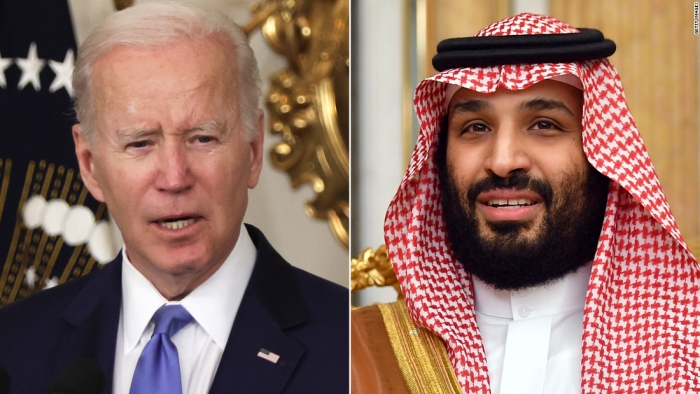
In a July 10 commentary, Biden wrote, “When I meet with Saudi leaders on Friday, my aim will be to strengthen a strategic partnership going forward that’s based on mutual interests and responsibilities, while also holding true to fundamental American values.”
The president also wrote, “My views on human rights are clear and long-standing, and fundamental freedoms are always on the agenda when I travel abroad.”
A response-commentary was published in The Post on July 11, saying, “A grip-and-grin photograph with MBS [Mohammed bin Salman] signals to autocrats everywhere that you can quite literally get away with murdering a journalist as long as you possess a natural resource the United States wants badly enough.”
House Minority Leader Rep. Kevin McCarthy (R-Calif.) tweeted, “Why would President Biden plead for more Saudi Arabian oil when we could be producing more domestic energy right here in America? Our country should be producing more oil by Americans, for Americans.”
Sen. Cruz: ‘Biden is Groveling to the Saudis … It’s a Mess’
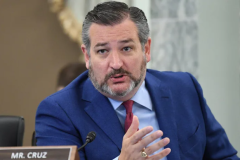
(CNS News) -- Senator Ted Cruz (R-Tex.) said President Joe Biden is "groveling to the Saudis" today because of the anti-energy "mess" his administration has produced. But he added that it is “perfectly appropriate” for the president to discuss the issue with the Saudis.
On Thursday, CNS News asked the senator, “Is it appropriate for President Biden to travel to Saudi Arabia and meet with Crown Prince Mohammed Bin Salman?”
Cruz replied: “Saudi Arabia is an important ally. Part of the reason that Biden is having to travel there is that for the last year and a half, he’s bent over backwards to alienate that ally, which has not been in America’s national security interests.”
“Now, Biden is groveling to the Saudis, asking them to produce more oil, after Biden has spent a year and a half hammering U.S. oil and gas production,” said Cruz. “So, it’s a mess, but it’s perfectly appropriate for the president to have a conversation with the Saudis.”
Biden is expected to meet with Saudi Arabia’s Crown Prince Mohammed bin Salman (MBS) today, July 15, in a trip many suspect is to secure more oil because domestic gasoline prices are very high. According to U.S. intelligence reports and other investigations, Mohammed bin Salman (MBS) approved a plan to kill Washington Post columnist Jamal Khashoggi. The writer was murdered and dismembered in the Saudi consulate in Istanbul in 2018.
When campaigning in 2020, Biden said, “I guarantee you, we’re going to end fossil fuels.”
Soon after taking office, Biden took action to reduce domestic production of oil, including revoking the permit for the Keystone XL Pipeline, which was expected to carry 830,000 barrels per day of Alberta oil sands crude to Nebraska, according to CNBC.
Biden claimed that oil is not the purpose of this week’s trip. “The commitments from the Saudis don’t relate to anything having to do with energy,” he said. “It happens to be a larger meeting taking place in Saudi Arabia. That’s the reason I’m going. And it has to do with national security for them — for Israelis.”
In March 2022, it was reported that the crown princes of Saudi Arabia and the United Arab Emirates refused to take calls from Biden – calls that likely had to do with securing allies against Russia and ensuring continued access to oil. The crown princes rejected the calls due to “unhappiness about Biden’s policies in the region,” reported the Times of Israel.
In a July 10 commentary in the Washington Post, Biden wrote, “When I meet with Saudi leaders on Friday, my aim will be to strengthen a strategic partnership going forward that’s based on mutual interests and responsibilities, while also holding true to fundamental American values,” he said.
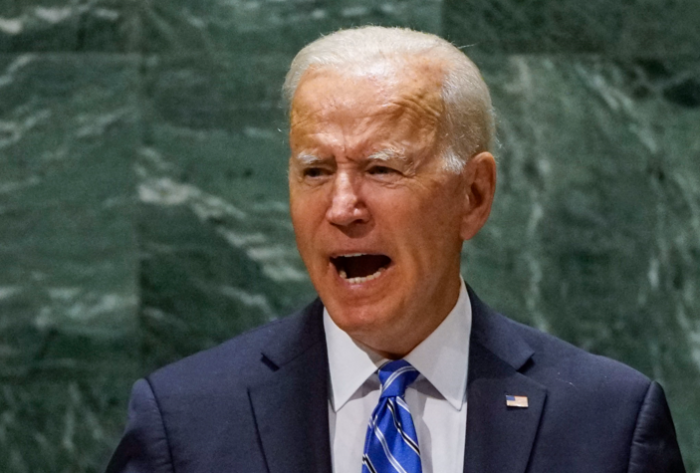
The president also wrote, “My views on human rights are clear and long-standing, and fundamental freedoms are always on the agenda when I travel abroad.”
A response-commentary was published in The Post on July 11, saying, “A grip-and-grin photograph with MBS [Mohammed bin Salman] signals to autocrats everywhere that you can quite literally get away with murdering a journalist as long as you possess a natural resource the United States wants badly enough.”
House Minority Leader Rep. Kevin McCarthy (R-Calif.) tweeted, “Why would President Biden plead for more Saudi Arabian oil when we could be producing more domestic energy right here in America? Our country should be producing more oil by Americans, for Americans.”
‘Pariah’ No More: Joe Biden Defends Meeting with Crown Prince Mohammed bin Salman as Saudis Laugh
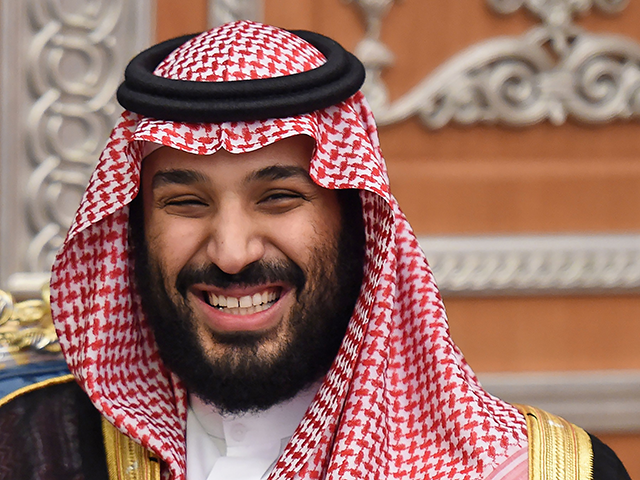
President Joe Biden defended his meeting with Saudi Arabian Crown Prince Mohammed bin Salman on Friday, attempting to reassure critics that he brought up the murder of Saudi dissident Jamal Khashoggi during the meeting.
“I raised it at the top of the meeting making it clear what I thought about it at the time and what I think of it now,” Biden said.
The president commented on his discussion of Khashoggi during remarks with reporters after the meetings, insisting he was direct with the Saudis.
“I was straightforward and direct when discussing it,” Biden said. “I made my view crystal clear. I said very straightforwardly. For an American president to be silent on an issue of human rights is inconsistent with who we are and who I am.”
“What happened to Khashoggi was outrageous,” he added.
Biden said the crown prince told him he was not responsible for Khashoggi’s murder.
“He basically said he was not personally responsible for it, I indicated I thought he was,” he said. “I indicated he probably was. He said he was not personally responsible for it and he took action against those who were responsible.”
Biden said he continued the conversation by telling the crown prince that murdering dissidents of the Saudi Arabian government was “viewed as to me a violation of human rights.”
The president tried to defend his meetings with the Saudis, despite vowing to treat them as a “pariah” during his presidential campaign.
“I did not come here to meet with the crown prince,” Biden said, after fist-bumping Salman when he arrived at the palace.
Biden argued he accomplished “significant business” during his meetings with Saudi officials, including increasing the likelihood of the Saudis increasing oil production.
“We had a good discussion on ensuring global energy security and adequate oil supplies to support global economic growth and that will begin shortly,” Biden said, adding he expected future announcements from the Saudis on oil production within weeks.
Despite Biden’s effort to promote his meetings as a success, some prominent Saudis mocked him as “diminished.”
“President Biden, in my view, he’s coming as a much-diminished president than when he was first elected,” said Saudi Arabian Prince Turki Al-Faisal in an interview with CNBC.
Biden has repeatedly explained to foreign leaders that his stance on human rights is part of the American culture, even acknowledging that other countries have “different norms”
When questioned about his sincerity on the issue of human rights, Biden recalled he also spoke to Chinese dictator Xi Jinping about slave labor in Xinjiang.
“I said look, I’m the president of the United States of America, for the United States president to remain silent on a clear violation of human rights is totally inconsistent with who we are what we are and what we would do what we believe,” he said.
Biden has previously cited his private conversations with Xi as part of an understanding he has with the Chinese dictator on the issue of human rights.
“So, the idea that I’m not going to speak out against what he’s doing in Hong Kong, what he’s doing with the Uighurs in Western Mountains of China, and Taiwan, trying to end the one-China policy by making it forceful,” he said during a 2021 town hall with CNN. “I said, and he gets it, culturally there are different norms in each country, and their leaders are expected to follow.”
Saudi Diplomat Refuses to Commit to Boosting Oil Production, Claims Increasing Production Won’t Really Help U.S. Gas Prices
During an interview aired on Friday’s edition of CNN’s “Situation Room,” Saudi Minister of State for Foreign Affairs Adel al-Jubeir, who was inside President Joe Biden’s meeting with Saudi Crown Prince Mohammed bin Salman, refused to commit to boosting oil production, denied Biden pressed them on the issue, and argued that “The problem of gasoline in the United States is more a function of the lack of refining capacity in the United States than a shortage of actual crude oil.”
Host Wolf Blitzer asked, “Did President Biden ask you, Saudi Arabia, to increase oil production with the hope that it would reduce the price of gasoline in the United States?”
Al-Jubeir answered, “Not in — with specificity because the president knows that [the] energy issue is an issue of supply and demand. It’s an issue of balancing markets. Saudi Arabia’s committed to ensuring stability in the oil markets. The U.S. government is aware of this. The issue of increases in prices of gasoline that we’ve seen recently are really a function of geopolitics and psychology more than they are about fundamental supply/demand. The problem of gasoline in the United States is more a function of the lack of refining capacity in the United States than a shortage of actual crude oil.”
Blitzer then asked, “But is Saudi Arabia ready to increase oil production?”
Al-Jubeir responded, “Saudi Arabia has made it very clear over the past decades that it seeks to [ensure] market stability, that it looks at the fundamentals of supply and demand, and that it works within OPEC and now within OPEC-plus to ensure that the markets are adequately supplied with crude oil. Saudi Arabia has increased its oil production over the past year substantially in accordance with the demands of the market, and this is a situation that is continuously being assessed by our Energy Ministry and by experts in this area to determine whether or not more oil is required or less oil is required.”
Blitzer then cut in to ask if Biden “pressed” the Saudis on this issue.
Al-Jubeir answered, “No, the president doesn’t press us on this issue. The president is aware that Saudi Arabia is keen on maintaining stability in the markets. Wolf, the President did not come here to press Saudi Arabia. The President came here to have a meeting with one of America’s most important allies in the world and in the region. We face common challenges that we need to work together in order to overcome. There are many opportunities for us that we want to avail ourselves of. He came here to consult on the various issues and how we can move forward in order to ensure that the next 80 years are as positive as the previous 80 years in our relationship.”
Follow Ian Hanchett on Twitter @IanHanchett
No comments:
Post a Comment